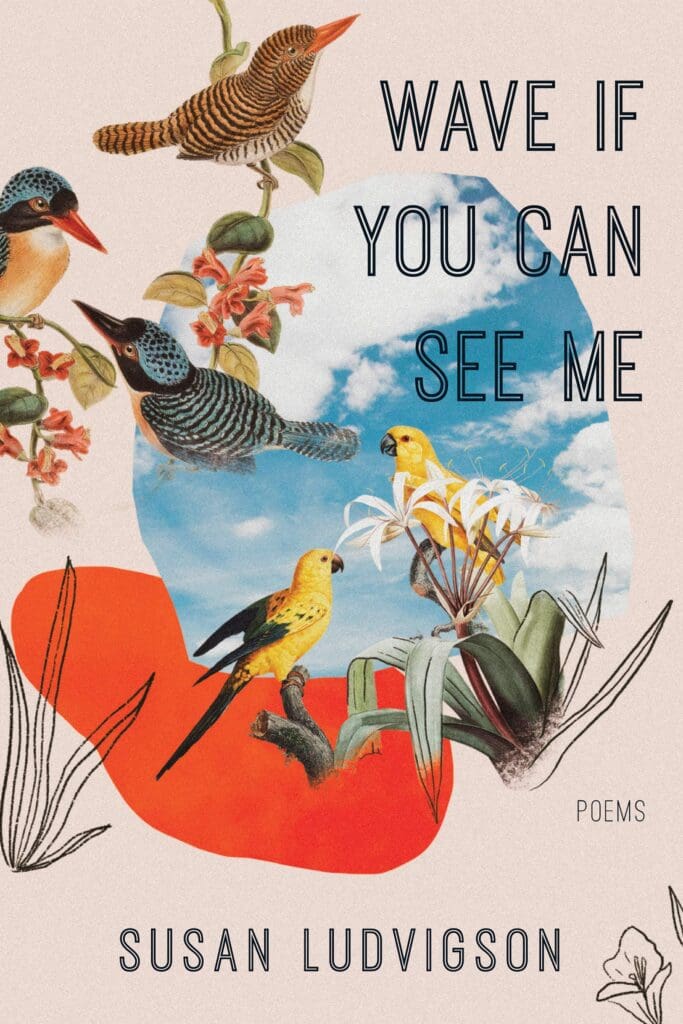Susan Ludvigson’s latest poetry collection, Wave If You Can See Me (72 pages; Red Hen Press), written in the wake of her husband’s death from long-term illness, is not a narrative of violent, all-consuming grief nor of its resulting numbness. Rather, it is a quiet depiction of longing and inquiry that waxes and wanes, from the perspective of a woman who has prepared extensively for loss. In its restraint, the collection attempts to answer seemingly ineffable questions: Can we know grief before it touches us? Can we begin to interrogate death if we haven’t inhabited it?
Ludvigson’s poems are quiet and linguistically unadorned, a testament to the starkness of bereavement. Despite the simplicity of her language, Ludvigson dedicates many of her poems to the careful description of sublime subjects: nature, travel, art. The notion of beauty that outlasts life is central, emerging as a force that keeps Ludvigson in conversation with her grief, while also propelling her beyond it. She reports an ability to momentarily lose herself in the world, despite the imminent death of her husband: “The world apple green, / full of promise. No one I loved / was dying.”
Interspersed throughout Ludvigson’s frequent meditations on the natural world are a series of ekphrastic poems, responding to the paintings of Caspar David Friedrich and Brian Rutenberg, among others. These poems, along with those depicting her personal dedication to painting, are some of the collection’s most compelling pieces. For Ludvigson, paintings serve two primary (and seemingly opposing) functions, acting as both windows into her psyche and as escape routes shuttling her, if only briefly, out of her grief. In centering her complex relationship with painted works in her poetry, Ludvigson exposes the fallibility of art and language itself—of that which represents, rather than simply exists. She constantly reminds the reader that neither her painting nor her poetry can fully depict grief as it manifests in life: “I’m trying to lead when I should be led, / need to trust the hand as if it were tracing / actual flesh, not charcoal on paper / or paint on canvas, but the thing itself,” she writes in “Nudes.”
Further complicating Wave If You Can See Me is Ludvigson’s late husband’s history as a Vietnam War veteran. It is implied that his illness and eventual death were caused by his exposure to the chemical Agent Orange during the war. While this detail is treated as peripheral, it contributes an underlying violence to the narrative that threatens the collection’s escapist interludes of nature and art. In the poem “Darker than Before,” the speaker recalls an experience in which her husband pulled a gun on her as he endured a flashback; the poem assumes a sinister, uneasy tone that is uncharacteristic of the rest of the collection, disrupting the illusion that all is joyful in the absence of illness and loss.
Despite these darker moments, Ludvigson’s collection remains a standout portrait of hope un-tempered by grief. She charts a distinct kind of journey through mourning—not one from anguish to quiet acceptance, but rather one characterized by inquiry and gratitude for the world her husband inhabits beyond life. Ludvigson’s poems are sympathetic to our uncertainties about death and loss, but ultimately serve to assert their place in our lives. “There is a lake outside, of course,” she writes. “You know it’s there. / There is no need to go there.” Loss, she seems to assert, is not an antagonistic force. It is instead the water we must all cross at one point or another. Wave If You Can See Me is Ludvigson’s message from across the shore, a simple but striking testament to all we have to gain from loss.


Thank you for the beautiful book review by Corinne Leong. Now I can’t wait to read Susan Ludvigson’s book. And I’ll be looking at the same time for more writing by Ms. Leong. How amazing that there is such a full picture given of the book in such a short review. So much to think about: what art can and cannot give us, and how many ways we can experience and, also, separately, communicate, grief as well as love.